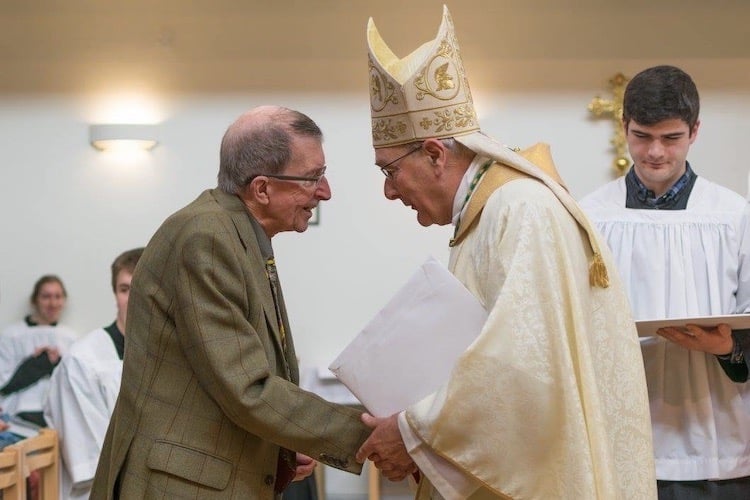<em>Nicholas Lash receives a papal knighthood from Bishop Alan Hopes in 2017</em>: <em>www.rcdea.org.uk</em>
On the evening of 7 November, Fisher House in Cambridge hosted the inaugural Nicholas Lash Memorial Lecture. Dr John McDade, former Principal of Heythrop College, took as his title <em>Nicholas Lash, the Church, and Synodality: “Truth is wrought out by many minds working together freely</em>“, quoting John Henry Newman. The lecture at the University’s Catholic Chaplaincy served not only as a tribute to Lash’s theological legacy but as an exploration of how his insights inform contemporary reflections on synodality within the Church.
Nicholas Lash, a laicised priest and towering figure in Catholic theology, held the prestigious Norris-Hulse Chair of Divinity from 1978 to 1999, and was the first Catholic to hold the position. This role symbolised more than a personal achievement; it was a mark of ecumenical progress and intellectual openness at Cambridge. As his widow fondly recalled, his two great loves were “the Catholic Church and Cambridge“ and his theology never bore the mark of sectarianism.
Dr McDade started with a remark on Lash’s theological pursuits as aligned with Vatican II's principles, an influence that would likely have drawn him to Pope Francis's focus on synodality – a process of governance and engagement that fosters collaboration, inclusivity, and discernment. Synodality embodies the Vatican II ethos by encouraging a “rising tide that lifts all boats,” McDade said. This vision for the Church seeks to create a “social imaginary” that transcends rigid hierarchy, moving away from the image of a monarchical Church and toward one that involves all the faithful. McDade went on to say that Lash believed the Church should not be bound by absolute power structures, which “shrivels the soul.” Instead, he saw synodality as an avenue to “conduct a more effective mission” by emphasising mutual respect and the acknowledgment that “things function only when they stand at attention to others”.
Dr McDade reflected on Lash’s nuanced view of the Church as not simply an institution, but as a living body – one whose vitality relies on the contributions and experiences of its members. Lash would say that every individual, whether through direct experience or shared community, encounters God in a personal way. This, he argued, negates the need for “religious experience” as a prerequisite to experience God’s presence. Lash’s theology speaks to a “Christian anthropology” that would emphasise the importance of understanding humanity’s role and dignity within the Church.
In Lash’s perspective, the Church faces the challenge of responding to “de-Christianization” in Europe. This reality requires thoughtful dialogue, yet he lamented the absence of substantive discussions on these issues within the English institutional Church. His critique points to a Catholicism he saw as at risk of idolatry, with the institutional and bureaucratic aspects potentially overshadowing the Gospel’s transformative message. McDade observed that the Church has not developed an anthropology of its own, which he viewed as a critical deficiency. For Lash, the lack of a robust Christian anthropology undermines the Church's mission, reducing faith to a set of rules rather than a mature, engaged understanding of human dignity.
The lecture also examined Lash's caution against the Church succumbing to absolute self-certainties, a pitfall he associated with a culture in adolescence, lacking the maturity to engage in genuine self-reflection. He believed the Church needed to transcend the polarising forces of the “culture wars” by balancing its institutional heritage with the courage of intellectual critique. This balance, he contended, was not a matter of one side “disposing of the other” but rather a harmonious integration of tradition with thoughtful questioning.
In an era marked by the temptations of theocracy, Lash advocated for a Church that remains humble, adaptive, and in dialogue with itself. He saw the potential for synodality to reorient the Church away from absolutism and closer to a model of governance that reflects the Body of Christ – one characterised by communion, respect and freedom. Notably, Dr McDade argued that Lash would have admired Pope Francis's disregard for the divisive culture wars that plagued his predecessors. In his words, the Church must avoid entrenching itself in rigid hierarchies or partisan battles but instead foster a spirit of unity grounded in shared faith and purpose.
Drawing upon Kafka’s haunting observation that “religions get lost as people do,” Dr McDade concluded by emphasising that Lash’s legacy lies in his commitment to a Church that is ever-relevant, yet not beholden to the past. His theology is a call for the faithful to embrace a Church not merely as an institution but as a community striving toward truth, guided by “many minds working together freely”, as Newman once remarked. In this spirit, Lash’s vision challenges Catholics to reimagine their place within the Church, to seek not power but understanding, not absolutism but communion – a Church that is, indeed, made “from below.”



